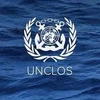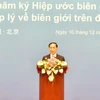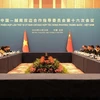The Prime Ministers of Vietnam and Japan have signed a joint statement on the implementation of action within the framework of the Strategic Partnership for Peace and Prosperity in Asia between the two countries.
The joint statement said Vietnamese Prime Minister Nguyen Tan Dung paid an official visit to Japan from Oct. 30-Nov. 2 at the invitation of Japanese Prime Minister Yoshihiko Noda. This was the first visit to Japan by Prime Minister Nguyen Tan Dung after he was re-elected as Prime Minister of Vietnam at the 13th National Assembly in July, 2011.
During the visit, PM Dung met the Emperor of Japan and held talks with Prime Minister Yoshihiko Noda, met with leaders of the Japanese parliament.
PM Dung made a tour of Sendai city and Natori city, Miyagi prefecture.
The statement emphasised Vietnam-Japan solidarity following the earthquake in northeastern Japan, saying that the two leaders described the goodwill acts and warm sentiment as evidence of the friendship built over past years by the two governments and peoples.
Regarding the achievements made by the two sides after the Vietnam-Japan Joint Statement in 2010, the statement said Vietnam and Japan once again affirmed their intention to strengthen and deepen cooperation in main fields.
On enhancement of exchange and dialogue, the two sides reaffirmed the importance of increasing high-level exchanges and dialogue between the two countries, especially maintaining high-level visits every year. The two sides also reaffirmed a commitment to boost bilateral relations at all levels and in all fields, as well as through existing dialogue channels.
They spoke highly of outcomes of the Vietnam-Japan first strategic partnership dialogue in December, 2010. They reaffirmed that the dialogue mechanism helped to increase and deepen the strategic partnership between the two countries and contributed to regional peace, stability and prosperity.
They decided to conduct the second strategic partnership dialogue in Tokyo in December.
In preparation for the celebration of the 40 th anniversary of the Vietnam-Japan diplomatic ties (1973-2013), the two sides decided to name 2013 as the “Year of Vietnam-Japan Friendship” and promote cooperative organisation of activities to celebrate the friendship year.
On economic cooperation, the Vietnamese side highly valued Japan’s assistance and progress in implementing projects stated in the 2010 Joint Statement.
PM Dung spoke highly of Japan’s continuous assistance to Vietnam’s prioritised infrastructure projects.
PM Dung also lauded the Japanese Government’s decision on provision of an official development assistance (ODA) loan worth 71.6 billion yen to Vietnam .
He hailed the signing of diplomatic notes and loan agreements for four projects on construction of the north-south highway (Ben Luc-Long Thanh section), the use of satellites for natural disaster control and climate change monitoring, construction of the Nghi Son thermal electricity plant and a climate change resilience support programme.
On trade and investment, the two sides affirmed the essential role of the Vietnam-Japan Economic Partnership Agreement (VJEPA) and the Vietnam-Japan agreement for liberalisation, promotion and protection of investment to step up bilateral economic ties, and acknowledged the importance of the effective implementation of these agreements.
They expressed their wish to at least double two-way trade by 2020.
On cooperation in energy, natural resources and climate change, the two sides hailed progress reached in cooperation over use of nuclear energy for peaceful purposes.
The Japanese side committed to increase nuclear safety through sharing experience and recent lessons relating to the nuclear incident at the Fukushima Daiichi nuclear power plant in a most transparent manner and explain its plan to step by step to improve nuclear safety.
The Vietnamese side welcomed Japan ’s efforts, explained the need for nuclear energy to ensure the energy supply in Vietnam and expressed its wish that Japan provides nuclear technology.
The Japanese expressed its intention to provide Vietnam with technologies ensuring safety at the highest level in the world and praised the Vietnamese Government for its approval of the Vietnam-Japan agreement on use of nuclear energy for peaceful purposes.
The Vietnamese side also expressed its hope that the agreement would be ratified soon in Japan after fulfilling necessary procedures.
The two sides reiterated the Vietnamese Government’s decision in choosing Japan as a cooperative partner to build two nuclear reactors at the proposed nuclear power plant 2 in Ninh Thuan province.
They hailed progress reached since the talks in October, 2010 and documents affirming the progress between the two governments.
The two sides also welcomed progress after the summit talks in October 2010 relating to cooperation in joint development of rare earth minerals in Vietnam and documents on the progress between the two governments, saying that this would promote cooperation between the two countries in surveying, exploring, exploiting and processing rare earth minerals in Vietnam.
They also hailed cooperation in the first project on rare earth minerals, which will begin in Dong Pao, Lai Chau province and is expected to be carried out after the document is signed.
The two sides reaffirmed the urgency to respond to climate change as well as the importance of implementing Cancun agreements.
The statement also mentioned cooperation in science and technology and human resource development, and increase in mutual understanding between the two countries’ people.
On regional and international cooperation, the two sides reaffirmed the importance in beefing up the ASEAN connectivity toward building the ASEAN Community by 2015. The two sides also welcomed progress in cooperation since the second Mekong-Japan high-level meeting in 2010 and acknowledged that the progress in the implementation of the “Mekong-Japan Action Plan 63” contributed to ASEAN connectivity.
The two sides acknowledged the importance of promoting cooperation in regional frameworks such as Mekong-Japan, ASEAN-Japan, ASEAN+3, EAS, ARF and APEC in order to build an Asia of prosperity and stability.
The two sides affirmed that peace and stability in the East Sea was the common interest of the international community. They welcomed the adoption of the Guidelines for the implementation of the Declaration of the Conduct of Parties in the East Sea (DOC) and called for the full implementation of the DOC and build a code of conduct (COC) soon, in line with existing international law.
The two sides affirmed that freedom of navigation, trade without barriers and observation of existing international law, including the 1982 UN Convention on the Law of the Sea and peaceful solving disputes were in line with the interest of countries in the region.
They also acknowledged that common interests need to be promoted and protected in the East Sea .
The two sides reaffirmed a resolve to accelerate cooperation to reform the UN Security Council, including expansion of permanent and non-permanent member numbers.
Prime Minister Dung reaffirmed that Vietnam backs Japan to become a UN Security Council permanent member./.
The joint statement said Vietnamese Prime Minister Nguyen Tan Dung paid an official visit to Japan from Oct. 30-Nov. 2 at the invitation of Japanese Prime Minister Yoshihiko Noda. This was the first visit to Japan by Prime Minister Nguyen Tan Dung after he was re-elected as Prime Minister of Vietnam at the 13th National Assembly in July, 2011.
During the visit, PM Dung met the Emperor of Japan and held talks with Prime Minister Yoshihiko Noda, met with leaders of the Japanese parliament.
PM Dung made a tour of Sendai city and Natori city, Miyagi prefecture.
The statement emphasised Vietnam-Japan solidarity following the earthquake in northeastern Japan, saying that the two leaders described the goodwill acts and warm sentiment as evidence of the friendship built over past years by the two governments and peoples.
Regarding the achievements made by the two sides after the Vietnam-Japan Joint Statement in 2010, the statement said Vietnam and Japan once again affirmed their intention to strengthen and deepen cooperation in main fields.
On enhancement of exchange and dialogue, the two sides reaffirmed the importance of increasing high-level exchanges and dialogue between the two countries, especially maintaining high-level visits every year. The two sides also reaffirmed a commitment to boost bilateral relations at all levels and in all fields, as well as through existing dialogue channels.
They spoke highly of outcomes of the Vietnam-Japan first strategic partnership dialogue in December, 2010. They reaffirmed that the dialogue mechanism helped to increase and deepen the strategic partnership between the two countries and contributed to regional peace, stability and prosperity.
They decided to conduct the second strategic partnership dialogue in Tokyo in December.
In preparation for the celebration of the 40 th anniversary of the Vietnam-Japan diplomatic ties (1973-2013), the two sides decided to name 2013 as the “Year of Vietnam-Japan Friendship” and promote cooperative organisation of activities to celebrate the friendship year.
On economic cooperation, the Vietnamese side highly valued Japan’s assistance and progress in implementing projects stated in the 2010 Joint Statement.
PM Dung spoke highly of Japan’s continuous assistance to Vietnam’s prioritised infrastructure projects.
PM Dung also lauded the Japanese Government’s decision on provision of an official development assistance (ODA) loan worth 71.6 billion yen to Vietnam .
He hailed the signing of diplomatic notes and loan agreements for four projects on construction of the north-south highway (Ben Luc-Long Thanh section), the use of satellites for natural disaster control and climate change monitoring, construction of the Nghi Son thermal electricity plant and a climate change resilience support programme.
On trade and investment, the two sides affirmed the essential role of the Vietnam-Japan Economic Partnership Agreement (VJEPA) and the Vietnam-Japan agreement for liberalisation, promotion and protection of investment to step up bilateral economic ties, and acknowledged the importance of the effective implementation of these agreements.
They expressed their wish to at least double two-way trade by 2020.
On cooperation in energy, natural resources and climate change, the two sides hailed progress reached in cooperation over use of nuclear energy for peaceful purposes.
The Japanese side committed to increase nuclear safety through sharing experience and recent lessons relating to the nuclear incident at the Fukushima Daiichi nuclear power plant in a most transparent manner and explain its plan to step by step to improve nuclear safety.
The Vietnamese side welcomed Japan ’s efforts, explained the need for nuclear energy to ensure the energy supply in Vietnam and expressed its wish that Japan provides nuclear technology.
The Japanese expressed its intention to provide Vietnam with technologies ensuring safety at the highest level in the world and praised the Vietnamese Government for its approval of the Vietnam-Japan agreement on use of nuclear energy for peaceful purposes.
The Vietnamese side also expressed its hope that the agreement would be ratified soon in Japan after fulfilling necessary procedures.
The two sides reiterated the Vietnamese Government’s decision in choosing Japan as a cooperative partner to build two nuclear reactors at the proposed nuclear power plant 2 in Ninh Thuan province.
They hailed progress reached since the talks in October, 2010 and documents affirming the progress between the two governments.
The two sides also welcomed progress after the summit talks in October 2010 relating to cooperation in joint development of rare earth minerals in Vietnam and documents on the progress between the two governments, saying that this would promote cooperation between the two countries in surveying, exploring, exploiting and processing rare earth minerals in Vietnam.
They also hailed cooperation in the first project on rare earth minerals, which will begin in Dong Pao, Lai Chau province and is expected to be carried out after the document is signed.
The two sides reaffirmed the urgency to respond to climate change as well as the importance of implementing Cancun agreements.
The statement also mentioned cooperation in science and technology and human resource development, and increase in mutual understanding between the two countries’ people.
On regional and international cooperation, the two sides reaffirmed the importance in beefing up the ASEAN connectivity toward building the ASEAN Community by 2015. The two sides also welcomed progress in cooperation since the second Mekong-Japan high-level meeting in 2010 and acknowledged that the progress in the implementation of the “Mekong-Japan Action Plan 63” contributed to ASEAN connectivity.
The two sides acknowledged the importance of promoting cooperation in regional frameworks such as Mekong-Japan, ASEAN-Japan, ASEAN+3, EAS, ARF and APEC in order to build an Asia of prosperity and stability.
The two sides affirmed that peace and stability in the East Sea was the common interest of the international community. They welcomed the adoption of the Guidelines for the implementation of the Declaration of the Conduct of Parties in the East Sea (DOC) and called for the full implementation of the DOC and build a code of conduct (COC) soon, in line with existing international law.
The two sides affirmed that freedom of navigation, trade without barriers and observation of existing international law, including the 1982 UN Convention on the Law of the Sea and peaceful solving disputes were in line with the interest of countries in the region.
They also acknowledged that common interests need to be promoted and protected in the East Sea .
The two sides reaffirmed a resolve to accelerate cooperation to reform the UN Security Council, including expansion of permanent and non-permanent member numbers.
Prime Minister Dung reaffirmed that Vietnam backs Japan to become a UN Security Council permanent member./.



















